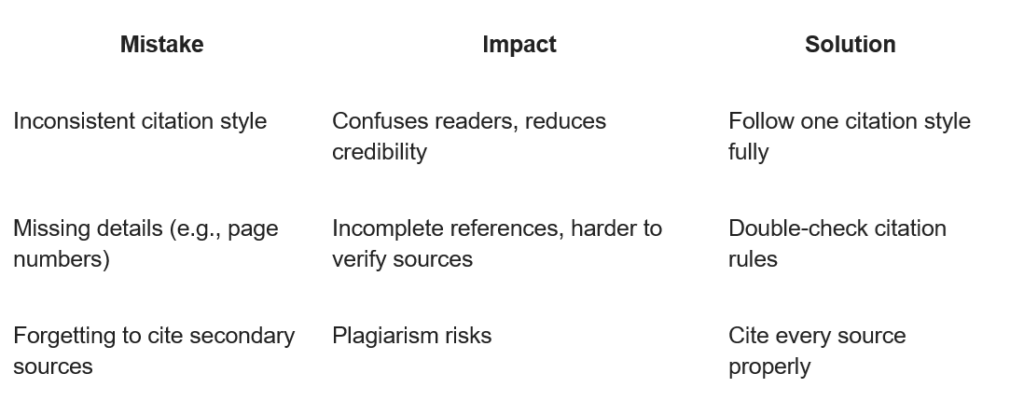Research paper writing involves careful planning and research. It is great, however common mistakes can ruin all your hard work. If you want a neat, crisp, well-professional paper, it’s as crucial to understand what not to include as what not to. In this article, let’s go through some of the most common pitfalls that you shouldn’t commit when it comes to composing a research paper. If you feel stuck or overwhelmed, you can pay someone to write my research paper. Academized is a service that offers professional help with research papers, allowing students to get well-crafted, plagiarism-free papers from experts in their field.
Towing Behind the Research Question
The foundation of a structured paper is a concise research question. Without one, your writing will drift and leave your readers hanging. A typical oversight is covering too many points. This is distracting and can leave the paper unstructured. Always stay focused on your central question or idea. All sections must refer to it so that the piece does not drift away from its subject matter.
Avoid Straying Off-Topic
When drafting, don’t be afraid to give your research question something that’s interesting but not needed. By relating irrelevant details, you are disorienting the reader and you are making an argument that is weak. Ensure every paragraph and every evidence supports your core question.
Neglecting Proper Citation
Citation errors are a big deal in research writing. You risk charges of plagiarism, even if it was intentional. This citation is necessary to attribute credit to the original source and allow your readers to verify your work. Many students find it helpful to use a coursework writer service to ensure they handle citations and other important aspects of writing correctly.
Common Citation Errors
Inconsistent citation styles are a prime example. If you have APA, MLA or Chicago style, stick to it throughout the entire paper. Another error is not including page numbers or any other information required by your style. Make sure you know the rules and adhere to them.

Don’t Revision and Edit
Once you have your draft done, you’re not done. So many students don’t go through the revision process, send in their draft without checking it for clarity, coherence or grammar errors. When you revise your paper, you’re making your arguments more compelling, deleting unnecessary detail and making your points explicit.
Importance of Proofreading
You should proofread your text in order to avoid the occasional typo or missed word which will not look professional at all. They might be small mistakes, but readers will see them and it makes your work look amateur. Reading through your paper and having someone else read over it can catch mistakes that you won’t notice.
Counting on Bad News Sources
Research article is only as good as the source that it comes from. Don’t trust old or faulty sources because it damages your reputation. Don’t look to blogs, op-eds or Wikipedia for primary information. Instead, use peer-reviewed journals, textbooks and respected websites to frame your point.
How To Choose Reliable Sources?
Make sure to seek out sources that are current — especially for areas such as science and technology, where data can become old in a hurry. In most cases, the only real good sources are peer reviewed papers — articles authored by professionals and vetted by others. Also check the author and publisher’s reputation to make sure you’re working with reliable content.
Overcomplicating Your Writing
Students assume that slang and latin phrases will be more professional for their paper. In fact, the more complex you write, the more unintelligible you’ll be. A concise, direct sentence is always more persuasive than a sentence full of unused titbits or arcane language.
Avoid Using Jargon
If your paper is jam-packed with jargon only professionals would comprehend, you can lose your readers. Use a little jargon, but always use language you may not understand well to an everyday person. Make it clear and concise whenever you can.
Avoiding the Thesis Statement
A strong thesis is your research paper’s foundation. It expresses your central argument or position. Most often, they don’t include the thesis at all or they are vague enough. Your paper is unlikely to be well-directed and focused if you don’t have a thesis.
What to Write in a Good Thesis?
Your thesis must be definite and concise, so your reader understands exactly what the paper will do or argue about. Try not to say anything general, preferably a point about your topic that you are going to elaborate on.
Conclusion
Creating a research paper isn’t simply a matter of collecting data and reporting on them. The things that are often done wrong (ignoring the research question, making the wrong references, failing to make revisions, having bad sources, overdoing the writing, not including a thesis, etc.) will improve the quality of your paper. Take all these tips into consideration and know what you don’t like to produce a clear, organised, solid paper that conveys your message effectively.
You can make sure your research paper is clean, well-written, and clear if you take the time to avoid these mistakes. With care, dedication to straight-forward, grammatically structured writing, you can give your research its best shot.
